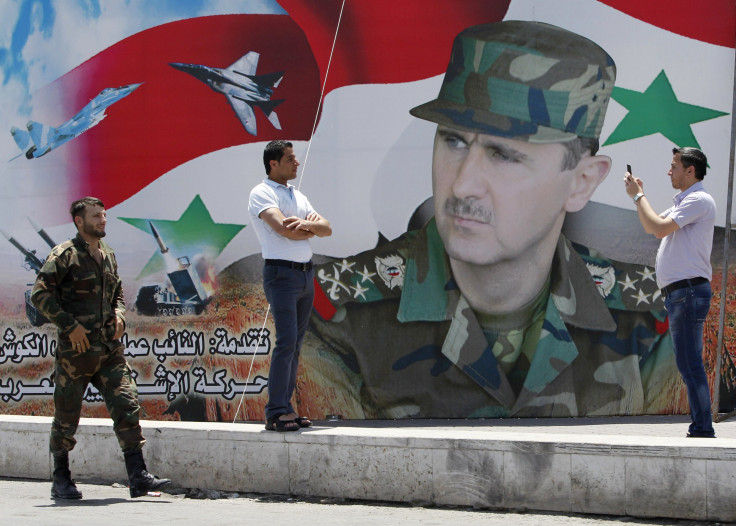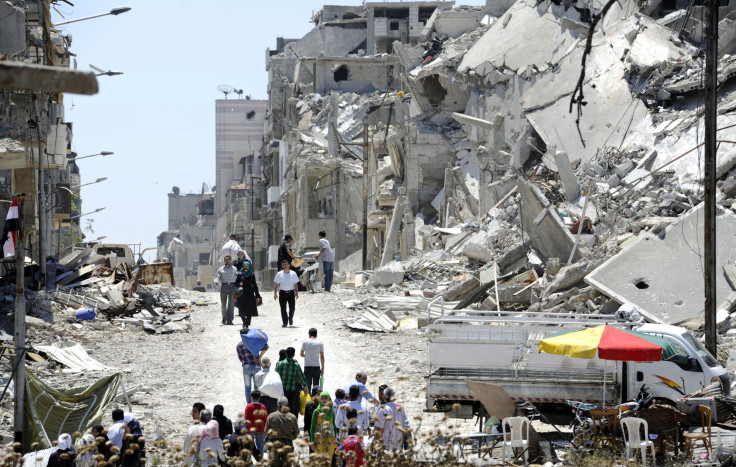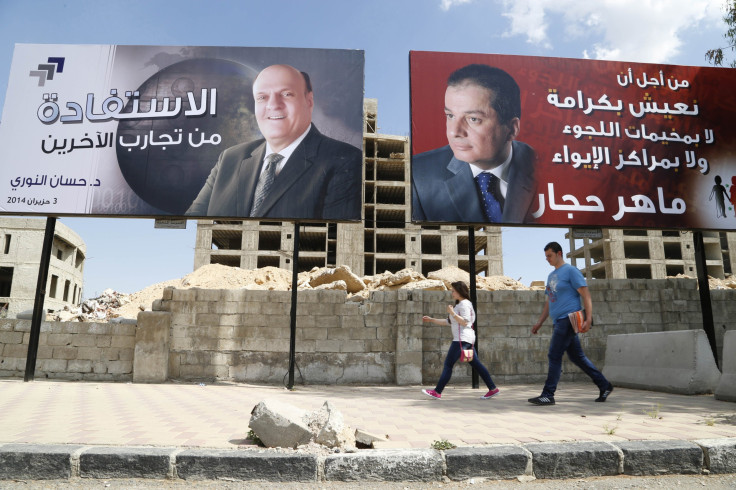Election In A War Zone: No One Expects Syria's Assad To Lose This One

DAMASCUS, Syria – For millions of Syrians who’ve fled their homes in a futile search for sanctuary from the bombs, voting is hardly a priority. If it weren’t for the campaign banners hanging from light poles in the capital and, occasionally, from the ruins of shattered buildings, it would have been easy to forget that Syria is about to hold its first multi-candidate election in four decades -- until an attack on a voting tent on Friday.
Syrian state TV reported that an election tent filled with dancing pro-Bashar al-Assad supporters in the southern Syrian city of Daraa was hit by mortars, according to Associated Press. Thirty-nine people were killed and 205 wounded, and Syrian TV showed several bodies of dead children.
Though the bombing confirmed earlier predictions that the election would prompt targeted attacks, primarily because it would bring together large groups of pro-Assad voters, the campaign has otherwise been muted, with the pre-election buzz mostly confined to government-controlled areas. Even there, most residents are resigned to the fact that President Assad will easily win reelection. Assad is, after all, a man who has for four years besieged his own country, including allegedly using chemical weapons, to stay in power, most recently in April, according to reports this week. No one expects him to allow himself to be voted out of office. And representatives of opposition groups, international humanitarian organizations and Western nations do not believe the vote will lead to a diplomatic solution to Syria’s civil war, now in its fourth year.
The Syrian government has confirmed that the election will proceed as planned on June 3. Earlier this month, two candidates running against Assad were approved by the parliament from a pool of names in what many people, including Assad loyalists, see as mere theatrics.
“Let me be clear. We all knew ahead of time who would be picked to run as opposition,” said one middle-aged Damascene and self-described Assad supporter who spoke with International Business Times, referring to the widely held belief that Assad hand-picked his opponents. (Like most Syrians who agree to be interviewed by the media, the man refused to identify himself because he feared retribution.) “And we already know that Assad is set to win the election by 70 percent, with the other two candidates sharing 30 percent.” Though most people are not this specific in predicting percentages, the man’s point of view was echoed by loyalists and opposition alike.
Yazan, who was educated in France but now lives in Damascus (and who provided only his first name), is another loyalist. He said the elections are just “for show.” Asked if he would vote anyway, he said, “Yes, and I’m voting for Assad. Not because I agree with him. The regime has many problems and we all know it. But what’s the alternative? The so-called opposition has offered nothing instead.”

“Victory to Assad!”
In the streets of Damascus, there is evidence of an attempt to mimic an actual election campaign. Cars painted with the colors of the Syrian flag can be seen making the rounds blaring pro-Assad music -- songs that sound like folk ballads, but with pro-Assad lyrics. They are largely ignored by other drivers and pedestrians.
Public schools let students out of class on a weekly basis to march in pro-government protests, often without first informing parents or asking for consent, “If the school tells parents about the march ahead of time, no one will send their kids to school that day,” said Sawsan, a mother of three, referring to the random mortar attacks that sometimes plague the city during public gatherings. “It can be very dangerous.” Though Sawsan is anti-government, she has instructed her children to obey school orders and chant pro-Assad slogans during the mandatory marches.
Pro-Assad banners in the capital are sponsored by local businesses and high-profile entrepreneurs. They function as product advertisements as much as political endorsements. One coffee maker placed his logo in the center of a huge banner with the slogan “Victory to Assad.”
There are no businesses in Damascus that publicly endorse either of the two other presidential candidates. Hassan al-Nouri and Maher al-Hajjar, both largely unknown personalities who for years worked within the government in some capacity, have each put up their own campaign banners here and there throughout the city, but they are largely lost in the sea of pro-Assad endorsements.

Despite the lack of debates and speeches that normally characterize an electoral campaign, each of the opponents has come up with a unique slogan. Al Nouri, who studied human resource management in the US and served as the general secretary of the Syrian Chamber of Industry, is campaigning to reform banking laws, an issue that is on few people’s minds in Syria today. Al Hajjar, whose former Communist Party has officially endorsed Assad, and who has photos circulating on social media of himself with a framed portrait of Assad in the background, promotes himself as someone who will help the displaced and the poor.
Who Can Vote?
If this were a real election, the campaign issues would be monumental, but as it is, the only issue is who can and will vote. An estimated 40 percent of the country is now outside government control, and Syrians who live in those areas have no way to reach the polls, which will be situated only in government-controlled areas. At least two million Syrians have fled the country, many of them with nothing but the clothes on their backs, as government warplanes bombarded their towns. Left without proper identification, hundreds of thousands of Syrians crossed through the porous Turkish and Lebanese borders to seek refuge. They are barred from voting in Syria’s upcoming election because they “exited illegally.”
There is no word yet from the Syrian authorities on how or whether the “legal refugees” in other countries might be able to vote, such as the 100,000 or so Syrians who live in the UN-run Zaatari camp in Jordan, where Assad supporters are rare.
It is also unclear whether former political detainees will be allowed to vote--though it hardly matters, since most of them are likely reluctant to enter a government building and have their ID punched into the master computer, which may return with a warning that they are wanted by this or that intelligence branch, resulting in on-the-spot detention.
The same goes for some four million Syrians who fled their homes in rebellious areas, many to seek shelter in government-controlled areas including Damascus and along the Syrian coast. They live with the onus of coming from a rebellious area, something a government checkpoint can decipher easily from their personal ID cards. To avoid run-ins with the authorities, such displaced civilians tend to keep low profiles, and the men often stay indoors to avoid having to show their ID at checkpoints (women’s papers are not as carefully scrutinized). These potential voters are unlikely to risk venturing into a polling station.
But failing to vote could also be problematic. Some anti-government citizens living in government-controlled areas have vowed to boycott the election. One such man wondered if there would be a mark on his permanent record indicating that he did not vote. “Will they be able to know every time they check my ID? Will I be punished for it somehow?” he asked, expressing a common fear.
In a normal election, issues that would make headlines and spark frenzied news conferences are largely ignored.
Among them: How and when will displaced Syrians, estimated at one in three of the country’s 23 million citizens, be able to return home? Who will finance the reconstruction phase once the civil war ends? How to bring to justice those who committed war crimes on all sides? And, perhaps most pressing of all: How to stop the ongoing war and incorporate the opposition along with rebellious citizens and their supporters into a new government moving forward? None of these questions is being addressed.
Instead, there are platitudes. “Damascus Furnishes Jasmine for Assad,” says one privately-sponsored banner that hangs on a main avenue, which has been closed to traffic for months due to a military checkpoint.
Government-sponsored banners show clasped hands with the theme “sawa” (“together” in Arabic). “Together We Are Safer,” some of them say.
“Together We Rebuild.”
The irony of promised rebuilding even as the destruction continues is not lost on Syrians. Periodic blasts and booms can be heard as government forces shell the suburbs, while warplanes buzz the sky on their way to bombard the few remaining rebellious pockets around the capital. Every few nights, mortar shells or car bombs rock Damascus and other government-controlled areas, presumably as retaliation against rebels.
One Damascene summed it up this way: “Election or not, it’s going to be more of the same misery for a long time.”
© Copyright IBTimes 2025. All rights reserved.





















